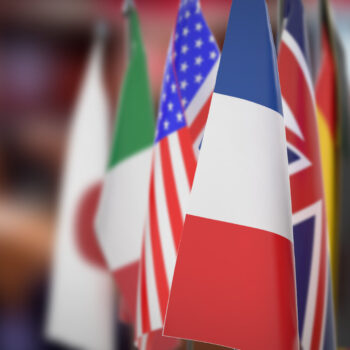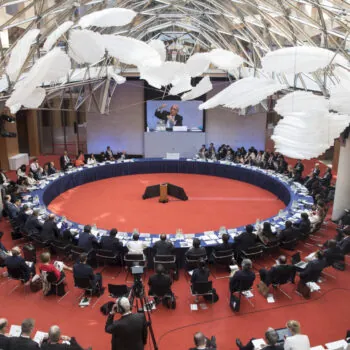The 2005 G8 summit at Gleneagles was overshadowed in many ways by the bombings in London.
Prior to the summit, much attention was focussed on whether Tony Blair would achieve his aim of securing a strong statement on Climate Change.
Two days later, E3G Chief Executive John Ashton appeared on the Radio 4 Today programme to discuss whether this did in fact occur, and what needs to happen next
You can listen to the archive recording of John’s interview on the Today programme website – scroll down the page to 7.50 am and click the link.
The transcript of the interview follows here below.
Introduction – Edward Stourton: There seems to be two schools of thought about yesterday’s G8 communiqué on climate change.
One says that the Prime Minister pushed the Americans as far as he realistically could, and secured an agreement that may have enduring value.
The other says the statement was nothing like strong enough and America should have been left isolated at the summit.
So how did the outcome match up to Mr Blair’s own stated objectives? For his assessment, here’s our correspondent Roger Harrabin…
[0.22 – 2.58 Audio report from Roger Harrabin, Environment Correspondent. Report includes input from David Hawkins of NRDC stating that if the USA had been isolated at the summit it might have been a better outcome.]
[Report ends with “The key question is does this communiqué do anything to address the scientists’ demand that we tackle climate change, urgently.”]
Edward Stourton: Roger Harrabin reporting. Well, Brian Hoskins is the Royal Society’s research professor; John Ashton is the Chief Executive of the environmental group Third Generation Environmentalism, and a former head of environmental affairs at the Foreign Office.
[Questions to Brian Hoskins on the science, and whether the Prime Minister was right to include the USA in the communiqué.]
[04.27] Edward Stourton: John Ashton, what do you make of this communique?
John Ashton: Well, I think it is certainly not a step backwards and there was a real danger in this process that it could have taken a step backwards, but nor it is a breakthrough.
It is probably useful to have the text, more useful it has probably been to have heads of government and their personal representatives talking about this subject for a year just in terms of raising awareness, but I think what really matters, and the real test of this text, is what is going to happen next.
The most interesting thing about the Gleneagles outcomes is the contrast between the debate on Africa, which is a real debate about large sums of money – about what investment you need to make poverty history – and the debate on climate, which is really been words.
We have words on paper in the climate communique and I think the opportunity now is to try to build on this communique and get this into an investment debate about how you can put 50 billion extra dollars of investment into climate, as we have just decided to do on Africa, and what we are going to get for that.
ES: As a former diplomat what’s your view of this question of whether it was right to sign up to something which is perhaps a bit weaker than many of the countries want, or whether it would have been better to try and back America into a corner?
JA: Well, I have some sympathy with the view that David Hawkins has just put. But, I also think in a way its a secondary question…
ES: Bryan Hoskins?
JA: No, David Hawkins, from the report, in Roger Harrabin’s report.
ES: In the report, yes, I beg your pardon.
JA: But I also think in a way it is a secondary question. I think, as I say, the key issue is what happens next. As far as America is concerned, in the end, it will be Americans who persuade the American administration to move, not other countries, not even I suspect G8 leaders.
[Questions to Brian Hoskins on what happens next and the value of the G8 as an international forum.]
[7.22] ES: Do you think that’s useful, John Ashton, with your sort of former diplomatic hat on, to have it [climate change] recognised on the agenda like this, presumably it means it’s something you can go back to?
JA: Clearly more dialogue is better than less dialogue but what really matters is the content of the dialogue.
I think one very important opportunity we now have in the UK is the presidency of the European Union where there is a big debate going on about the future of the European budget and how to modernise that and make it more relevant to today’s problems.
The obvious opportunity is to say: “Look, what matters today is climate security, we need to re-balance from food security to climate security, move public investment from farm subsidies into climate technologies”.
ES: But that obviously doesn’t help with the American element…
JA: Well, I think it does actually. Because I think what that would do is to start growing a market for the next generation of energy and transport technologies. And that would create business pressures that in fact I suspect would be far more likely to start shifting views in the American administration than the kind of intergovernmental conversations that we have been talking about today.
ES: John Ashton, Brian Hoskins thanks both very much indeed.


